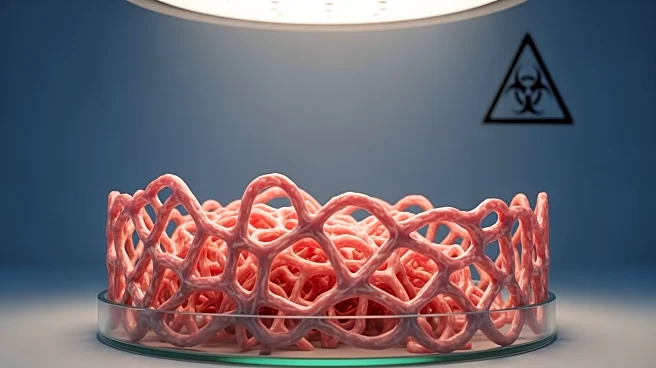What's Happening?
Recent research has explored various techniques for creating scaffolds used in cultured meat production, focusing on chemical crosslinking methods. These methods involve forming covalent bonds with polymer
chains to create stable scaffolds. However, the study highlights significant toxicity risks associated with commonly used chemical crosslinkers such as glutaraldehyde, epoxy compounds, and diisocyanates. These substances can cause respiratory issues, skin irritation, and other health problems. The research suggests exploring less toxic alternatives or non-chemical methods like enzymatic crosslinking to mitigate these risks. The study also discusses physical crosslinking methods, which avoid additives and may improve food safety.
Why It's Important?
The findings are crucial for the cultured meat industry, which aims to provide sustainable and ethical alternatives to traditional meat. The toxicity risks associated with chemical crosslinkers could impact consumer safety and regulatory compliance, potentially hindering the industry's growth. By identifying safer crosslinking methods, the industry can improve the biocompatibility of scaffolds, ensuring better cell viability and human health. This research could lead to advancements in scaffold design, enhancing the quality and safety of cultured meat products, and supporting the industry's efforts to scale production while maintaining high safety standards.
What's Next?
The study suggests further exploration of enzymatic crosslinking as a safer alternative to chemical methods. Researchers and industry stakeholders may focus on developing and testing new crosslinkers that offer stability without compromising safety. Additionally, regulatory bodies might consider revising guidelines to ensure that cultured meat products meet safety standards. The industry could also invest in research to optimize scaffold designs, improving their mechanical properties and biocompatibility. These efforts could pave the way for more widespread adoption of cultured meat, addressing consumer concerns about safety and sustainability.
Beyond the Headlines
The research highlights ethical considerations in cultured meat production, emphasizing the need for transparency in ingredient sourcing and manufacturing processes. As the industry evolves, it may face scrutiny over the environmental impact of production methods and the ethical implications of using certain chemicals. Long-term, the shift towards safer crosslinking methods could influence public perception, fostering greater acceptance of cultured meat as a viable alternative to traditional meat. This could lead to broader cultural shifts in dietary habits and food production practices.










